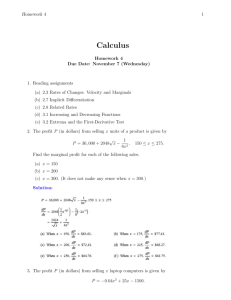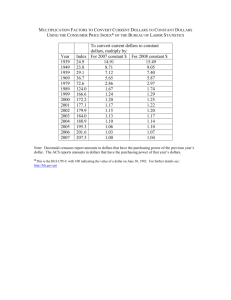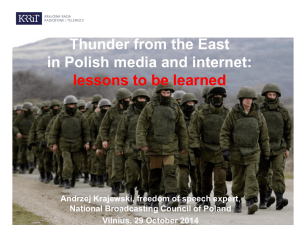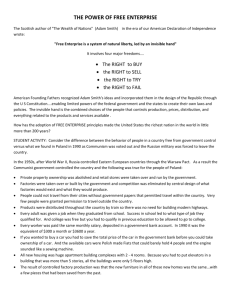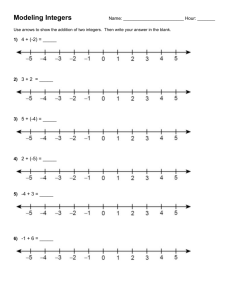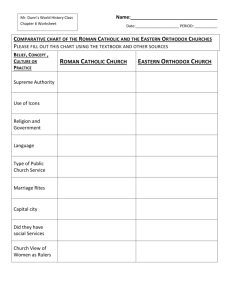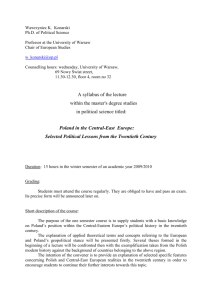Sarmatian Review Data
advertisement
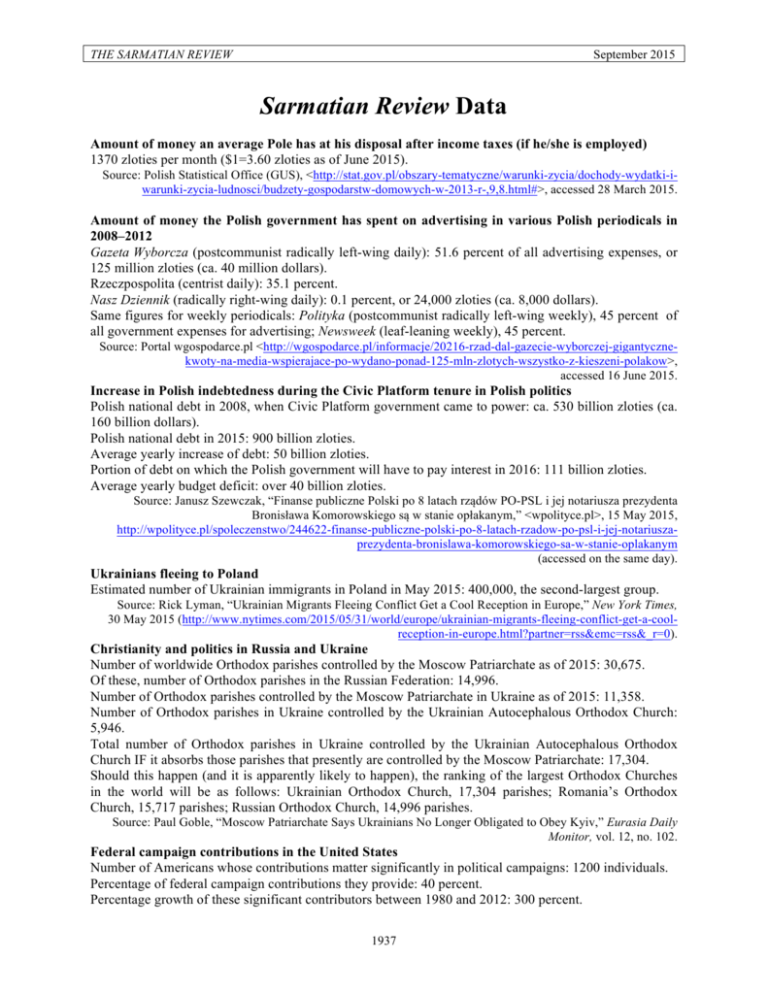
THE SARMATIAN REVIEW September 2015 Sarmatian Review Data Amount of money an average Pole has at his disposal after income taxes (if he/she is employed) 1370 zloties per month ($1=3.60 zloties as of June 2015). Source: Polish Statistical Office (GUS), <http://stat.gov.pl/obszary-tematyczne/warunki-zycia/dochody-wydatki-iwarunki-zycia-ludnosci/budzety-gospodarstw-domowych-w-2013-r-,9,8.html#>, accessed 28 March 2015. Amount of money the Polish government has spent on advertising in various Polish periodicals in 2008–2012 Gazeta Wyborcza (postcommunist radically left-wing daily): 51.6 percent of all advertising expenses, or 125 million zloties (ca. 40 million dollars). Rzeczpospolita (centrist daily): 35.1 percent. Nasz Dziennik (radically right-wing daily): 0.1 percent, or 24,000 zloties (ca. 8,000 dollars). Same figures for weekly periodicals: Polityka (postcommunist radically left-wing weekly), 45 percent of all government expenses for advertising; Newsweek (leaf-leaning weekly), 45 percent. Source: Portal wgospodarce.pl <http://wgospodarce.pl/informacje/20216-rzad-dal-gazecie-wyborczej-gigantycznekwoty-na-media-wspierajace-po-wydano-ponad-125-mln-zlotych-wszystko-z-kieszeni-polakow>, accessed 16 June 2015. Increase in Polish indebtedness during the Civic Platform tenure in Polish politics Polish national debt in 2008, when Civic Platform government came to power: ca. 530 billion zloties (ca. 160 billion dollars). Polish national debt in 2015: 900 billion zloties. Average yearly increase of debt: 50 billion zloties. Portion of debt on which the Polish government will have to pay interest in 2016: 111 billion zloties. Average yearly budget deficit: over 40 billion zloties. Source: Janusz Szewczak, “Finanse publiczne Polski po 8 latach rządów PO-PSL i jej notariusza prezydenta Bronisława Komorowskiego są w stanie opłakanym,” <wpolityce.pl>, 15 May 2015, http://wpolityce.pl/spoleczenstwo/244622-finanse-publiczne-polski-po-8-latach-rzadow-po-psl-i-jej-notariuszaprezydenta-bronislawa-komorowskiego-sa-w-stanie-oplakanym (accessed on the same day). Ukrainians fleeing to Poland Estimated number of Ukrainian immigrants in Poland in May 2015: 400,000, the second-largest group. Source: Rick Lyman, “Ukrainian Migrants Fleeing Conflict Get a Cool Reception in Europe,” New York Times, 30 May 2015 (http://www.nytimes.com/2015/05/31/world/europe/ukrainian-migrants-fleeing-conflict-get-a-coolreception-in-europe.html?partner=rss&emc=rss&_r=0). Christianity and politics in Russia and Ukraine Number of worldwide Orthodox parishes controlled by the Moscow Patriarchate as of 2015: 30,675. Of these, number of Orthodox parishes in the Russian Federation: 14,996. Number of Orthodox parishes controlled by the Moscow Patriarchate in Ukraine as of 2015: 11,358. Number of Orthodox parishes in Ukraine controlled by the Ukrainian Autocephalous Orthodox Church: 5,946. Total number of Orthodox parishes in Ukraine controlled by the Ukrainian Autocephalous Orthodox Church IF it absorbs those parishes that presently are controlled by the Moscow Patriarchate: 17,304. Should this happen (and it is apparently likely to happen), the ranking of the largest Orthodox Churches in the world will be as follows: Ukrainian Orthodox Church, 17,304 parishes; Romania’s Orthodox Church, 15,717 parishes; Russian Orthodox Church, 14,996 parishes. Source: Paul Goble, “Moscow Patriarchate Says Ukrainians No Longer Obligated to Obey Kyiv,” Eurasia Daily Monitor, vol. 12, no. 102. Federal campaign contributions in the United States Number of Americans whose contributions matter significantly in political campaigns: 1200 individuals. Percentage of federal campaign contributions they provide: 40 percent. Percentage growth of these significant contributors between 1980 and 2012: 300 percent. 1937 THE SARMATIAN REVIEW September 2015 Source: Kevin Drum, “It’s Not the 1% Controlling Politics. It’s the 0.01 Percent,” Mother Jones, April 2015 <http://www.motherjones.com/kevin-drum/2015/04/one-percent-campaign-giving>, accessed 23 April 2015. Who is rich and where Amount of money the top 1 percent make per year (adjusted for Purchasing Power Parity) in various countries: Switzerland, $171,832; United States, $151,534; Great Britain, $118,836; Germany, $95,150; Russia, $47, 083; Poland, $46,371. Note: these numbers refer to one person: for a family of four they should be be multiplied by four. Source: Branko Milanovic of the Luxembourg Income Study, as reported by Matt O’Brien of the Washington Post, 3 June 2015 <http://www.washingtonpost.com/blogs/wonkblog/wp/2015/06/03/how-much-money-the-richest-1percent-make-in-25-countries-around-the-world/?tid=pm_business_pop_b>, accessed on the same day. World countries ranked by conventional military power in 2015 1.United States, 2. Russia, 3. China, 4. India, 5. United Kingdom, 6. France, 7. South Korea, 8. Germany, 9. Japan, 10. Turkey. Source: Global Firepower <http://www.globalfirepower.com/countries-listing-europe.asp>, accessed 5 June 2015. European countries ranked by conventional military power in 2015 1. United Kingdom, 2. France, 3. Germany, 4. Italy, 5. Poland, 6. Ukraine, 7. Czech Republic, 8. Switzerland, 9. Austria, 10. Netherlands. Source: Global Firepower <http://www.globalfirepower.com/countries-listing-europe.asp>, accessed 5 June 2015. Prices Gazprom charged its various European customers in 2013–2014: For 1000 cubed meters of gas, Poland paid 429 dollars in 2013 and 379 dollars in 2014; Hungary 418 dollars in 2013 and 338 dollars in 2014; Austria 402 dollars in 2013 and 329 in 2014; Slovakia 438 dollars in 2013 and 308 dollars in 2014; France 404 dollars in 2013 and 338 dollars in 2014; Germany 366 dollars in 2013 and 323 dollars in 2014. Average Gazprom prices for 2012: Poland 500 dollars per cubic meter of gas; Western Europe 440 dollars. Additional clauses in the agreement: Poland is obliged to pay for the agreed-on amount of gas even if she is unable to use it all; Poland cannot resell unused gas to any other country. Party and negotiator responsible for signing contracts obliging Poland to pay the highest prices in the EU for the Russian gas: Civic Platform government under Donald Tusk and Waldemar Pawlak (PSL aligned with the ruling Civic Platform), who negotiated the contract and signed it in December 2010. Contract length: from 2012 to 2022. Source: Russian News Agency Interfax, as reported by Zbigniew Kuźmiuk in <salon24.pl> and <niezalezna.pl>, 7 March 2015 <http://niezalezna.pl/64872-polski-gaz-z-rosji-najdrozej-w-ue>, accessed on the same day. Sanctions? What sanctions? Event at the International Economic Forum at St. Petersburg held June 18–20, 2015: initialing the agreement between Gazprom, German E. On (Düsseldorf-based holding company that runs electric utility service providers for 33 million people worldwide), and Austrian gas and oil firm OMV regarding construction by 2020 on the floor of the Baltic Sea of two additional gas pipelines for the North Stream. Amount of gas the additional pipelines will be able to carry: 55 billion cubic meters, or as much as is being transferred by the presently existing pipeline. Anticipated way of transporting the additional 50 billion cubic meters of gas to the EU: by building a new pipeline, the Turkish Stream from the Black Sea through Turkey and Greece. Anticipated changes concerning Poland, Ukraine, and the Baltic countries: the existing pipelines (the Yamal pipeline that runs through Belarus and Poland, and the Ukrainian pipeline that runs though Ukraine) will go out of use and these countries will be cut off from direct supplies of Russian gas. U.S. participation in the Forum: U.S. authorities allowed American businessmen to attend in 2015. They were forbidden to attend in 2014 due to sanctions. Source: Zbigniew Kuźmiuk, “Mimo nałożonych na Rosję sankcji wielkie zachodnie firmy angażują się w wieloletnie projekty inwestycyjne z rosyjskim Gazpromem,” Portal <wpolityce.pl>, 20 June 2015, < http://wpolityce.pl/gospodarka/256677-mimo-nalozonych-na-rosje-sankcji-wielkie-zachodnie-firmy-angazuja-siew-wieloletnie-projekty-inwestycyjne-z-rosyjskim-gazpromem>, accessed on the same day. 1938
